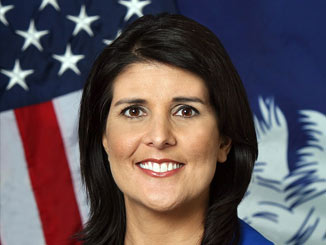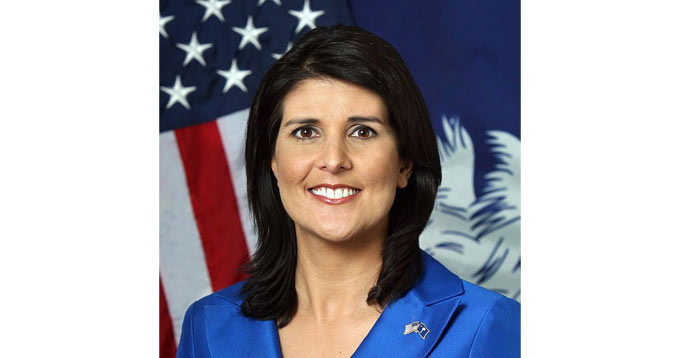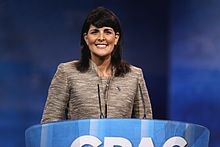

Nimarata Nikki Haley (born Randhawa; born January 20, 1972) has dropped out of the Republican race for US President leaving Doland Trump unchallenged to be the Republican candidate in the upcoming US Election.
Haley is an American politician and diplomat who served as the 116th governor of South Carolina from 2011 to 2017 and as the 29th United States ambassador to the United Nations from January 2017 to December 2018. A member of the Republican Party, Haley is the first Indian American to serve in a presidential cabinet. She is a candidate in the 2024 Republican Party presidential primaries. After winning the Washington, D.C. primary on March 3, 2024, Haley became the first woman to win a Republican presidential primary in U.S. history.
Haley joined her family’s clothing business before serving as treasurer and then president of the National Association of Women Business Owners. She was elected to the South Carolina House of Representatives in 2004 and served three terms. In 2010, during her third term, she was elected governor of South Carolina. Haley was South Carolina‘s first female governor and the second U.S. governor of Indian descent, after Bobby Jindal of Louisiana. During her time as governor, she received national attention for leading the state’s response to the 2015 Charleston church shooting.
In January 2017, Haley resigned as governor to become U.S. ambassador to the United Nations in the administration of Donald Trump. The US Senate confirmed her by a vote of 96–4. She stepped down as ambassador on December 31, 2018.
Haley announced her campaign for President of the United States in February 2023, making her the first woman of Indian decent to for the office.
Early life and education

Haley’s 1989 high school yearbook photo
Haley was born Nimarata Nikki Randhawa at Bamberg County Hospital in Bamberg, South Carolina, to immigrant Sikh parents from Amritsar, Punjab, India. Her father, Ajit Singh Randhawa, was a professor at Punjab Agricultural University, and her mother, Raj Kaur Randhawa, received her law degree from the University of Delhi.
Her parents emigrated from India to Canada in 1964 after Ajit received a scholarship offer from the University of British Columbia. After he received his PhD in 1969, he moved with his family to South Carolina, where he was a professor of biology at Voorhees College, a historically black institution in Denmark, South Carolina. He retired from teaching in 1998. Raj earned her master’s degree in education and taught for seven years in Bamberg public schools. In May 1976, she opened a popular women’s clothing boutique, Exotica International, in West Columbia. At age 12, Nikki Randhawa began helping with bookkeeping at the clothing shop. In 1993, the Randhawas opened The Gentlemen’s Quarters, a male counterpart to Exotica. The stores closed in 2008 upon Raj’s retirement from merchandising.
Haley has two brothers and a sister. She attended Orangeburg Preparatory Schools, graduating in 1989. She graduated from Clemson University in 1994 with a B.S. degree in accounting and finance. Haley has been known by her middle name, Nikki, a Punjabi name meaning “little one”, since she was born.
Early career
After graduating from college, Haley worked for FCR Corporation, a waste management and recycling company, before joining her family’s clothing business as its bookkeeper and chief financial officer. After she married Michael Haley in 1996, she became active in civic affairs. In 1998, she was named to the board of directors of the Orangeburg County Chamber of Commerce. She was named to the board of directors of the Lexington Chamber of Commerce in 2003. Haley became treasurer of the National Association of Women Business Owners in 2003, and president in 2004.
Haley chaired the Lexington Gala to raise funds for a local hospital. She also served on the Lexington Medical Foundation, Lexington County Sheriff’s Foundation, and West Metro Republican Women. She was the president of the South Carolina Chapter of the National Association of Women Business Owners, and was chair for the 2006 Friends of Scouting Leadership Division campaign.
South Carolina House of Representatives (2005–2011)
Campaigns
In 2004, Haley ran for the South Carolina House of Representatives to represent District 87 in Lexington County. She ran in the Republican primary on a platform of education reform and property tax relief. Initially, she ran because she believed that incumbent Republican state representative Larry Koon, who was the longest-serving legislator in the South Carolina Statehouse at the time, was not going to seek re-election. However, Koon entered the race just before the filing deadline. Nevertheless, Haley stayed in the race.
In the primary election, Koon received 42 percent of the vote, Haley received 40 percent, and David Perry received 17 percent. As no candidate received a majority of the vote (50 percent or higher), Haley and Koon advanced to a runoff election on June 22. In the runoff, she defeated Koon 55 percent to 45 percent. After his loss, Koon accused Haley of running a smear campaign, which she denied. She ran unopposed in the general election.
Haley became the first Indian-American to hold office in South Carolina. She was unopposed for re-election to a second term in 2006. In 2008, she won re-election with 83 percent of the vote, defeating Democrat Edgar Gomez, who garnered only 17 percent.
In 2012, Haley credited Hillary Clinton with inspiring her to run for office; in an interview she said:
“The reason I actually ran for office is because of Hillary Clinton. She said that when it comes to women running for office, there will be everybody that tells you why you shouldn’t, but that’s all the reasons why we need you to do it, and I walked out of there thinking, ‘That’s it. I’m running for office.'”
Legislative tenure and policies
Haley was elected chair of the freshman caucus in 2005 and majority whip in the South Carolina General Assembly. She was the only freshman legislator who had been named to be a whip at the time.
One of Haley’s stated goals was to lower taxes. She voted against a proposed cigarette surtax three times. She voted for a bill that raised sales taxes from five cents per dollar to six cents per dollar, exempted sales tax on unprepared food such as canned goods, and exempted property tax on “owner-occupied residential property” except for the taxes due from what is still owed on the property. Haley was named a “Taxpayer Hero” by Governor Mark Sanford in 2005 and a “Friend of the Taxpayer” by the South Carolina Association of Taxpayers in 2009.
Haley implemented a plan in which teachers’ salaries would be based on not only seniority and qualifications but also job performance, as determined by evaluations and reports from principals, students, and parents. She supports school choice and charter schools.
Haley also supports barring legislators from collecting legislative pensions while in office. She believes such pensions should be based on only the $10,400 legislative salary instead of the salary plus lawmakers’ $12,000 annual expense allowance.
Haley has stated that, as a daughter of immigrants, she believes the immigration laws should be enforced. She voted in favor of a law that requires employers to be able to prove that newly hired employees are legal residents of the United States, and also requires all immigrants to carry documentation at all times proving that they are legally in the United States.
Haley describes herself as pro-life and has supported legislation to restrict abortion. She has stated “I’m not pro-life because the Republican Party tells me. I’m pro-life because all of us have had experiences of what it means to have one of these special little ones in our life.” In 2009, she co-sponsored a bill that would mandate a 24-hour waiting period for women seeking abortions after an ultrasound, also known as the “reflecting” period. The bill passed both legislative chambers in 2010 and was signed into law by Governor Sanford later that year.
In 2016, as governor, Haley re-signed a new state law that bans abortions at 20 weeks of pregnancy. She has voted in favor of some abortion-related bills that were tabled or rejected, including the Inclusion of Unborn Child/Fetus in Definition for Civil Suits Amendment, Prohibiting Employment Termination Due to Abortion Waiting Period amendment, and Exempting Cases of Rape from Abortion Waiting Period amendment. The latter would have allowed women not to have to wait 24 hours before having an abortion in some cases.
As a state legislator, Haley served on the Committee on Labor, Commerce and Industry and the Committee on Medical, Military, Public and Municipal Affairs. She had several caucus memberships, including the Freshman Caucus in 2005–06 (chair), the Sportsman’s Caucus, and the Women’s Caucus in 2007 (vice chair). She also served on the Lexington County Meth Taskforce.
Governor of South Carolina (2011–2017)
2010 gubernatorial election
On May 14, 2009, Haley announced that she would run for the Republican nomination for governor of South Carolina in the 2010 election. Haley had been persuaded to run by incumbent governor and fellow Republican Mark Sanford. She was endorsed by former Massachusetts Governor Mitt Romney, as well as Jenny Sanford, the first lady of South Carolina. Haley also received the endorsement of former Alaska Governor Sarah Palin three weeks before the primary.
The Republican gubernatorial primary took place on June 8, 2010, and Haley received 49% of the vote, forcing a runoff election on June 22. Haley won the runoff vote 65 to 35 percent.
Haley was elected governor on November 2, 2010, defeating Democratic candidate Vincent Sheheen, 51% to 47%. She is considered the third non-white governor elected by a Southern state, after Virginia‘s Douglas Wilder and Louisiana’s Bobby Jindal.
2014 re-election

Haley speaking at the Conservative Political Action Conference in National Harbor, Maryland, March 2013
On August 12, 2013, Haley announced she would seek a second term as governor. She faced a challenge in the Republican primary from Tom Ervin, who later withdrew and reentered the race as an independent. As in 2010, Vincent Sheheen of the Democratic Party ran against Haley. Libertarian Steve French and United Citizens Party candidate Morgan Bruce Reeves also ran. The five candidates debated twice. A week after the second debate, Ervin withdrew from the race and endorsed Sheheen.
Haley was re-elected on November 4, 2014, defeating Sheheen, 55.9% to 41.3%.[82]
Tenure
Haley took office as governor in January 2011. In 2012, former governor Mitt Romney considered her for his vice-presidential running mate. Haley said that she would turn down any potential vice presidential offer.
In June 2011, Haley signed an “Arizona-style” immigration law. Much of the act was blocked by the federal courts, which found several key provisions to be unconstitutional.
During her second term, Haley feuded with veteran lawmakers in the General Assembly. She endorsed powerful senate finance chairman Hugh Leatherman‘s primary opponent in 2016. After winning the primary, Leatherman stated that Haley was not just a lame duck, but a “dead duck”.[88] Her second term as governor was set to expire on January 9, 2019; however, Haley resigned her position on January 24, 2017, to serve as U.S. ambassador to the United Nations.]
Haley delivered the official Republican response to President Barack Obama‘s 2016 State of the Union Address on January 12, 2016.
In 2016, Haley was named by Time magazine as one of the 100 most influential people in the world.
Haley was mentioned in January 2016 as a potential candidate for vice presidency in the 2016 presidential election. On May 4, 2016, after Trump became the presumptive presidential nominee, Haley said she had no interest in the vice presidential nomination.
Four lieutenant governors served under Haley. Haley, a Republican, welcomed Yancey McGill, a Democrat, to serve as her lieutenant governor after Glenn F. McConnell‘s resignation. Haley was initially against having a Democrat serve as the second-in-command to the governor, but she, along with the Senate, eventually acquiesced.
On December 17, 2012, Haley announced she would appoint Tim Scott to fill the vacancy created by the resignation of Senator Jim DeMint, who previously announced that he would retire from the Senate to become the president of the Heritage Foundation. Following his appointment, Scott became the first African American U.S. senator from South Carolina.
Haley chose Scott over others on her short list, including Representative Trey Gowdy, former South Carolina attorney general Henry McMaster, former First Lady of South Carolina Jenny Sanford, and South Carolina Department of Health and Environmental Control Director Catherine Templeton.
In July 2013, Haley was fined $3,500 by the State Ethics Commission and given a “public warning” for failing to report the addresses of eight donors during her 2010 campaign for governor.
In August 2013, Haley signed an extradition order for Dusten Brown to be brought to South Carolina in the Adoptive Couple v. Baby Girl case.
